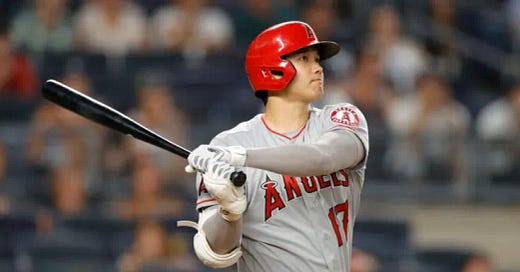Shohei Ohtani Shows A Better World Is Possible
Last week on the MLB Network, Brian Kenny and Joel Sherman had a very funny debate about Shohei Ohtani. Kenny was trying to argue that Ohtani, who has become baseball’s biggest star this season with a league-leading 33 home runs before the All-Star break while also being an elite starting pitcher for the Angels, should give up pitching to focus on hitting.
Normally, this would be the kind of contrarian argument you make just to fill time on TV, but Kenny is usually pretty reasonable. He’s not the kind of Skip Bayless/Stephen A. Smith figure who takes crazy positions just to argue them. Indeed, what made this debate so funny was that Kenny was NOT trying to be sensational—he was just reflexively arguing a piece of conventional wisdom that, as Sherman pointed out, had been disproven by the last three months:
Sherman: “He’s the best Los Angeles Angel. He’s their best pitcher. He’s their best hitter. Why would you change anything?”
Kenny: “Because he could thrive as your best offensive player.”
Sherman: “But he IS thriving as their best offensive player.”
Kenny: “The ERA now is at 3.60. If you could get that and .600 slugging and he does both healthy, that’s great.”
Sherman: “But you ARE getting that!”
Indeed, you can see here that Kenny is simply making a version of the argument that has followed Ohtani ever since he came over from Japan: This isn’t going to work. It’s an argument people like Kenny have made so often that Sherman is forced to point out the obvious: It’s already working!
Of course, Ohtani’s run won’t last forever. Eventually he will hit a slump. This already happened for him as a pitcher, as he gave up seven runs in 2/3 of an inning against Yankees (in a game the Yankees still somehow managed to lose), ballooning his ERA from 2.58 to 3.60 and inspiring Kenny’s take. But, as Sherman pointed out in the segment, even elite starters have bad games. Nobody’s peak is sustainable—that’s what makes it a peak. And anyway, in his next start, Ohtani gave up two runs over seven innings against the first place Red Sox, so he hasn’t exactly lost his touch—he’s still the best starter on the Angels by far. So the idea that the Angels would be BETTER if he stopped hitting or pitching, when he is both their best hitter and their best pitcher, is just not grounded in reality.
Watching the Kenny/Sherman debate made me think about inflation. In the same way that baseball experts have for years been sure that you cannot be both an elite pitcher and an elite hitter, economists have long insisted that robust government support for the poor and the unemployed would lead to runaway inflation. That was supposedly the reason that government spending had to be reined in and workers had to suffer. This was so taken for granted that when the government DID mail checks to everyone and boost unemployment benefits, economists like Larry Summers did what Brian Kenny is doing on Ohtani: repeatedly insist that the plan is not working even though it clearly is.
Summers and others searched desperately for signs of inflation, like Kenny looking for signs that Ohtani is not performing. When Summers and Co. found things like rising lumber prices or increased used car sales, they ignored obvious explanations, like supply-shocks from the pandemic or pent-up demand from lockdowns the same way Kenny inflated the importance of one bad Ohtani start. Their goal seemed to be to vindicate this piece of conventional wisdom, and not actually address the economic problems people have faced during the pandemic.
For years now, a good chunk of political debate has been taken by people insisting that things simply cannot get better. There is an entire media industry devoted to telling you why Medicare For All is too expensive, why a Green New Deal will never pass Congress, and why Defund the Police was a counterproductive slogan. It is important to engage in those debates and refute each of them on their own merits, but they are all symptoms of a larger disease that plagues the left—the feeling that things simply cannot get better.
It's important to be honest about the challenges that political movements face, but one of the lessons of Shohei Ohtani’s season is that we don’t really know what is possible. For basically a century, a player clubbing 33 home runs while pitching to a 133 ERA+ was the kind of thing you wouldn’t even put in a video game. Now we know it’s possible, and the beautiful thing about sports is that once that happens it’s only a matter of time before more people follow in his footsteps, as the four-minute mile example famously shows.
Outside of sports, things are not quite as simple—Larry Summers is advising President Biden right now. But we should nevertheless take the lesson from Ohtani’s success that unlikely things do, in fact, happen, and we ought to recognize them when they do instead of clinging to the morsels of yesterday’s conventional wisdom.



